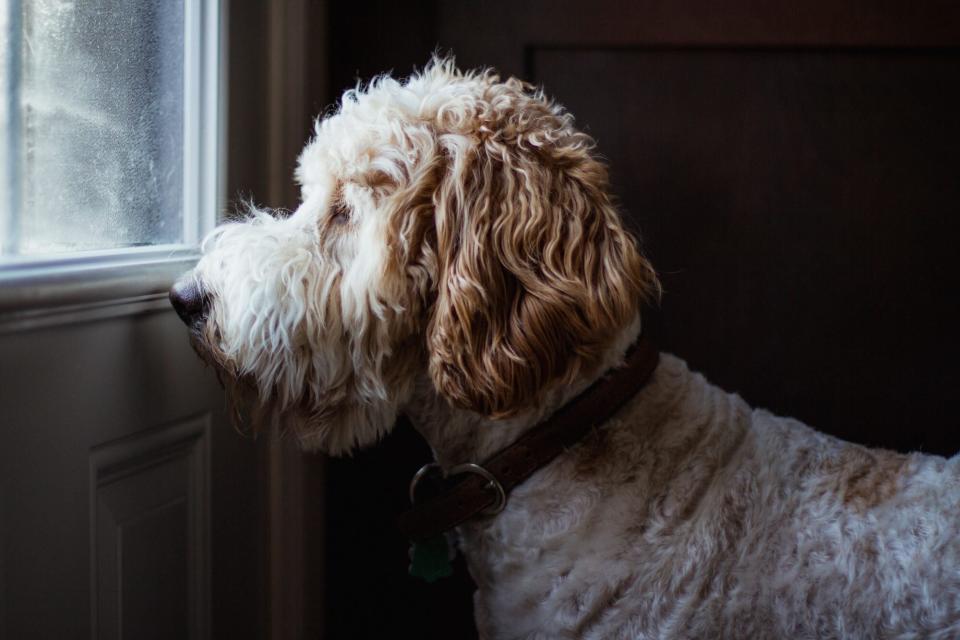5 Tips for Preparing Your Dog For Your Return to Work After a Year at Home
Many of us have spent the better part of the past year working from home. While there were inevitably some parts you enjoyed, like wearing the same pair of sweatpants every day and cuddling with your dog during Zoom breaks, it's time to prepare for your return to the office. Human interaction! Snacks in the break room! You've missed it! Unfortunately, your dog probably isn't as enthusiastic about the change.
Though your pup's sense of time isn't as accurate as yours, he still craves a rhythm, explains Dave Wilbert, owner of Sit Means Sit Syracuse. If you've spent the bulk of the past year working from home, it's likely that your dog has gotten used to being with you 24/7 and will need help adjusting to your new routine.
Here are Wilbert's tips for making the transition back to the office smooth for everyone involved.
Start Slowly
Fortunately, dogs are fairly adaptable, Wilbert says, adding that "within a week" most pups will have adjusted to whatever new routine you've thrown their way, including an end to your remote work life. However, you'll still want to plan ahead. Don't go from taking your pooch on leisurely midday strolls to being gone all day without any warning.
Consider Crate Training
When it comes to preparing your dog for your return to work, Wilbert says, "Crate training is a huge first step."
He suggests starting by putting your dog in his crate for short periods of time throughout the day, like while you run an errand.
"This gets the dog back into the mindset of, 'I'm okay in a room you're not in. I'm okay being alone for a length of time,'" Wilbert says.
And remember "dogs live in the moment," Wilbert says. "Some people see that as a detriment, but I think it's an advantage. You can really prepare your dog to be away from you easily, because they don't know if you've been gone for ten minutes or an hour. You don't have to practice being gone for a full eight hours to get your dog adjusted."
This means a quick trip down the street to the drugstore will be equally as effective when it comes to prepping your dog for time apart as a full day at the office would be.

Getty/Linda Raymond
Don’t Make a Grand Entrance When You Return
When you do return home and go to let your pup out of the crate, Wilbert advises against making your return a dramatic affair, as tempting as it may be.
"People come home and are excited to greet their dog, so they make a big deal out of it, which is a huge mistake. Moving forward, all that dog is thinking of is the anticipation of you coming home," Wilbert says.
This exuberant "Hi! I'm home!" routine can exasperate separation anxiety issues. Instead, let the dog out of the crate, give him some attention, but then continue on with your day as if your return wasn't a major milestone. This teaches both of you that your pup is okay with or without you home all day.
Be Patient During This Adjustment Period
Though dogs do adjust to new routines fairly easily, you'll want to be patient as you introduce a new daily rhythm, even if this routine was once familiar to your pup. You may notice more accidents, chewing, or other bad behaviors during this time, hence why Wilbert is a proponent of crate training.
"Some people have a reluctance to crate train, but it helps to keep your home and your dog safe while you're gone," he explains.
Yes, Dogs Can Experience Separation Anxiety
Just like kids, know that your pooch may experience bouts of separation anxiety, particularly as you start spending more time away from home than you have in recent months. In fact, Wilbert says it's one of the main reasons why clients are seeking help from his Sit Means Sit team.
"It used to be that we'd have the occasional client dealing with it, but now it's like, 'Holy cow, this is such a common thing!'" he says.
If your normally well-behaved dog is acting out of character lately, know that you're probably just in an adjustment period. As frustrating as accidents or other bad behavior might be, have patience with your pup. They're going through a major life shift just like you are.

